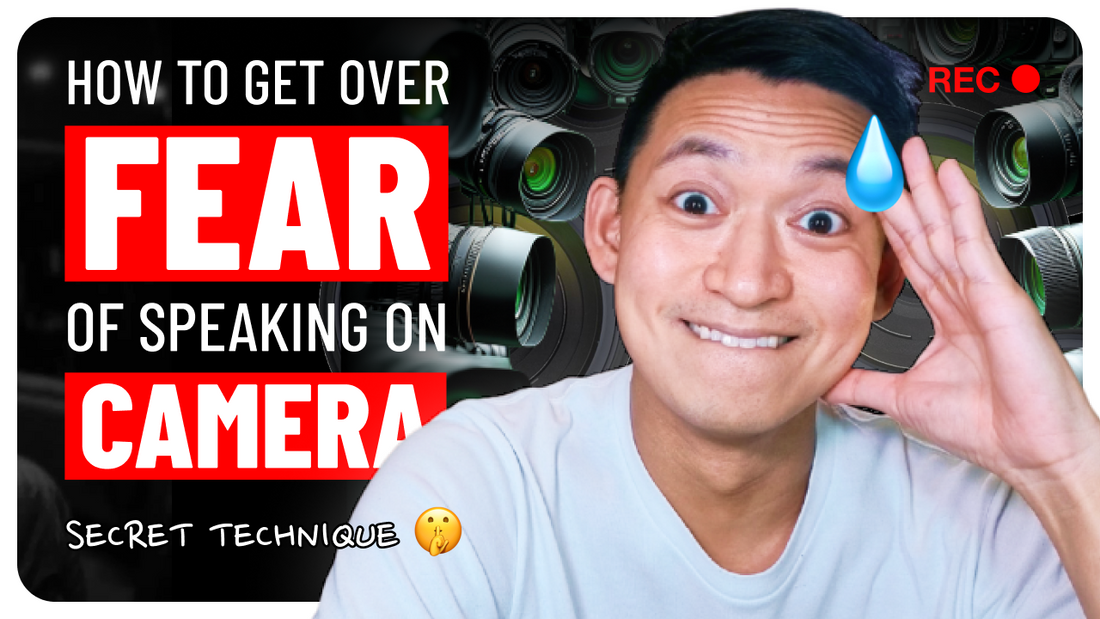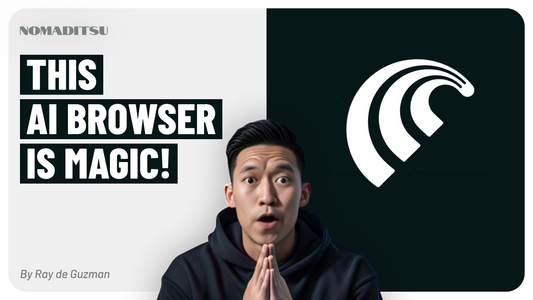

Video Description
Overview
If looking at the camera fills you with a sense of dread... If you feel you've tried all of the conventional wisdom around how to get over fear of speaking on camera and it's still not working, this might be the video that solves the problem permanently.
In this video, I share a technique I learned from the world of acting that I've adapted to help conquer my fear of the camera and to feel more natural when speaking on video. I used to feel a wall of judgement coming from the camera lens that was really distracting and overwhelming. No matter how much I would try to talk myself into ignoring it or changing how I feel about it, it would still interfere with my delivery on camera. With this new technique, the fear is gone, and I'm actually warming up to the camera, able to feel more natural and casual like I've always wanted.
If this helps you out, support the channel with a Like, Subscribe, or Comment. I'd really appreciate it!
Chapters
- 00:00 The Struggle
- 00:07 My Initial Approach
- 00:24 How I Got To Publishing My First Video
- 01:02 Popular Techniques Didn't Work For Me
- 01:11 Another Rabbit Hole: Acting
- 01:44 How Does Acting Work?
- 02:42 How Good Acting Works
- 03:43 Tennis Analogy For Acting
- 04:30 The Outside World Drives The Inner World
- 04:53 The Aha Moment
- 05:29 How I Cured My Phobia Of The Camera
- 06:16 How I Got Over Fear of Judgement
- 06:58 Humanizing The Lens
- 08:02 Recap
- 09:42 Thank You
Featured Resources
- Thanks to Brad Heller of thehellerapproach channel for their explanation of how to be a better actor! Watch here
Gear Used
- Shot in 4K on the Insta360 GO 3S + Andoer Tripod*
- Insta360 GO 3S
- Andoer MT-08 Mini-Tripod
Related Videos
Connect
Alternate Titles
- How to confidently speak on camera: For Introverts & YouTube Beginners
- How to get over Fear of Judgement
Tags
- #perfectionism
- #psychology
- #stagefright
- #anxiety
- #acting
- #lifehacks
- #awkwardness
- #fear
- #youtuber
- #publicspeaking
- #publicspeaker
- #presenting
- #cameraconfidence
Thai Description
วิธีเอาชนะความกลัวในการพูดหน้ากล้อง | สำหรับนักเก็บตัวและมือใหม่ YouTube | กลัวคำพิพากษา
หากการมองกล้องทำให้คุณรู้สึกหวาดกลัว... หากคุณรู้สึกว่าคุณได้ลองใช้ภูมิปัญญาดั้งเดิมเกี่ยวกับวิธีการเอาชนะความกลัวในการพูดหน้ากล้องแล้ว แต่ก็ยังไม่ได้ผล นี่อาจเป็นวิดีโอที่จะแก้ปัญหาได้ ปัญหาอย่างถาวร
ในวิดีโอนี้ ฉันแชร์เทคนิคที่ฉันเรียนรู้จากโลกแห่งการแสดงที่ฉันปรบใช้เพื่อช่วยเอาชนะความกลัวกล้องและรู้สึกเป็นธรรมชาติมากขึ้นเมื่อพูดในวิดีโอ
ฉันเคยรู้สึกถึงกำแพงแห่งการตัดสินที่มาจากเลนส์กล้องซึ่งทำให้เสียสมาธิและล้นหลามจริงๆ ไม่ว่าฉันจะพยายามพูดกับตัวเองให้เพกเฉยหรือเปลี่ยนความรู้สึกเกี่ยวกับมันมากแค่ไหน มันก็จะยังคงรบกวนการแสดงของฉันในกล้อง ด้วยเทคนิคใหม่นี้ ความกลัวก็หมดไป และฉันก็รู้สึกอบอุ่นใจเมื่ออยู่หน้ากล้องจริงๆ ทำให้รู้สึกเป็นธรรมชาติและสบายๆ มากขึ้นอย่างที่ฉันต้องการมาตลอด
หากสิ่งนี้ช่วยคุณได้ ให้สนับสนุนช่องด้วยการกดไลค์ ติดตาม หรือแสดงความคิดเห็น ฉันจะซาบซึ้งจริงๆ!
Transcript
The Struggle
I've struggled with speaking on camera for the longest time and actually that's one of the main reasons why I started this channel. I thought that if I want to conquer this area of my life the best way to do it is to start a channel and just do it consistently. I thought if I could get myself to fall in love with creating content and speaking on camera that eventually I would get better. It did work to some degree. I'll share a little bit of how much work it took for me to actually make my first video. It actually took me a couple of months of journaling. I used a lot of psychology tricks on myself. I would do a lot of reframing exercises, trying to do these mental gymnastics to change the idea of what speaking on camera is, and that worked enough where I could get myself to push past the fear and record videos. But I look at those videos and I think it's pretty clear it was me forcing myself to speak on camera and just go through the fear, but the fear is still there.
Popular Techniques Didn't Work
So I've watched a lot of videos of how to overcome this problem and a lot of the techniques didn't really work. But luckily I started looking down some other paths. I started looking into acting and I went down that rabbit hole and it brought me to this video and this video really transformed my whole perspective and understanding of how to come across more natural. I don't think any other YouTube video talks about how to overcome your fear of the camera in this way. So I'm using an acting technique to help you overcome your fear of the camera. This video comes from the Heller Approach Acting Studio Channel and how they described it was that the problem with acting is first it's in the name, because acting gives this impression that you're doing something, you're performing. But good acting is you're just being the character. You are recreating a real human and reacting as if that is a real human. You're not manufacturing or performing, you're actually trying to be that person.
How Good Acting Works
Then he goes into talking about how do you create another realistic human being, how do humans work, and how does that differ from bad acting. What I learned is that robotic acting is you are telling yourself, okay, I have to say this thing now or now I have to do this thing. That is more performance and that is also more like what a robot would do. You give it instructions and then it does the instructions exactly as you tell it, but that comes off as very awkward and not real. So he recommends that real acting is receiving. You have to be able to take in signal from the other person and based on what you're taking in is what determines what you put out. It's not just I'm pushing out what I think is how it should be. And I think that was my problem before where I thought, okay, I just have to look and talk in a specific way that I believe is the right way to speak, but that didn't lead to anything feeling authentic or real and it cut me off from a real-time communication, a real-time interaction. I didn't know that could be something that happens on camera, but that's what real videos feel like. It feels like a real conversation and that's what I wanted to achieve. I was like, man, how do people come across so natural, but then when I do my videos it feels so robotic and manufactured and not natural.
The Tennis Analogy & Feedback Loop
So back to this approach. He says you have to take in the outside world and then from that you will produce your action based on what you're getting in. It became even more clear when he gave this analogy of a tennis match. In a tennis match you are fully engaged the entire time. If you were to just pay attention to when you hit the ball and then just stand there waiting for your turn, by the time they hit it back to you, you're done. You don't have enough time because you weren't paying attention, you weren't agile. So this acting thing is like you have to be on point the whole time and you're watching even when you're not talking. You are watching and trying to eek out what are you getting back so you could give a real reaction. The last thing he said was that everything we do is based on the outside world. As much as I would usually try to fight against that idea and thinking that oh, I'm determining everything, but when you think about it, it is true that everything is driven by the outside world. Whether we like it or not, we are just constantly reacting and it's just a constant to and fro. So that made me think like, wow, so there is a feedback loop. What if I apply that to the camera? And when I started to apply that, I started to look at the camera lens and think, what if this is a two-way conversation? I have to imagine that there is a feedback loop and there's something coming back even though it doesn't, like there's nothing there. But if you're actually waiting for it and watching for it, anticipating it, it makes your video feel so much more alive and it feels more realistic that you're having a conversation.
Overcoming Fear of Judgment
That is what cured my phobia of the camera lens. I was terrified and always awkward in front of the camera because I was always afraid of judgment. Whenever I think of the camera, whenever I see the camera, I would imagine just this wall of judgment and all those other exercises were about trying to change that idea of the judgment, which is like, you know, you can use a lot of therapeutic or reframing psychology techniques to try to change that fear of judgment. But this technique of actually looking at the lens and imagining and watching for the feedback loop, looking for the tennis ball coming back at you and then determining how you're going to respond back, that thing surprisingly cured my fear of judgment. Because as I'm looking and trying to be present and feel for what am I getting back, it actually shows me that there's no judgment in the moment at least. Maybe I'll get some comments later, but as you engage with the camera and you are watching as if it's a tennis match and you have to be ready to respond, it shows you that there's nothing to fear. There's only just the camera lens. So paying attention to the camera lens and actually looking for feedback eliminates the fear of judgment because you're realizing there is no judgment coming back. That totally transformed how I approach talking on camera.
Humanizing the Lens & Recap
The other effect is that once you are looking for this feedback from the camera lens, it actually kind of personifies or gives the camera lens more of a human feel. You're able to see now the camera for what it is. First, you're not imagining this wall of judgment anymore, so the looking for the feedback just removes the judgment, removes the fear. Then on the second level, as you're imagining feedback coming back from the lens, it gives it more of a human feel and you're imagining more like, okay, what would be coming through the camera lens if it was a person? If it was a person on the other end, what would that be? And then you start thinking of the camera as a person instead of an inanimate object or some kind of scary device or a portal to millions of people. All of those ideas go away. That was just mind-blowing to me, and I think if you watch any of my other videos, you'll notice a huge difference in how this is coming across.
Summary
So yeah, let's recap. The summary is: to get rid of your fear of the camera, realize that you could use an acting technique. Realize that robotic acting happens because you are not factoring in the other party. To have a realistic and more intimate, more dynamic and casual conversation where you can connect with an audience, you have to imagine the camera as another partner in this, and it helps to imagine a back and forth feedback loop constantly. It never stops. You're watching for signals and then you're going to use that signal to determine what you're going to say next, and having this back and forth and watching for the signal that you're getting from the camera lens will completely eliminate any fear you had because you're realizing that there is no judgment coming at you in the moment from that lens. Paying attention to the lens is what's going to help you stay present in the moment and dispel any fear you had because now you're realizing there is no actual judgment. I'm watching for it and at minimum there's a neutral feedback loop. At best, you will start to embody this lens with a human touch, a human soul, and it'll make your videos so much more casual and it'll make you feel a lot less nervous in front of the camera. You could just be yourself and have a conversation, a real conversation with somebody on the other end. Yeah, I just wanted to share that with you unscripted. That's it for now. Don't forget to like and subscribe if this helped you out. Have a great one, all the best in your videos. Nitsu.



